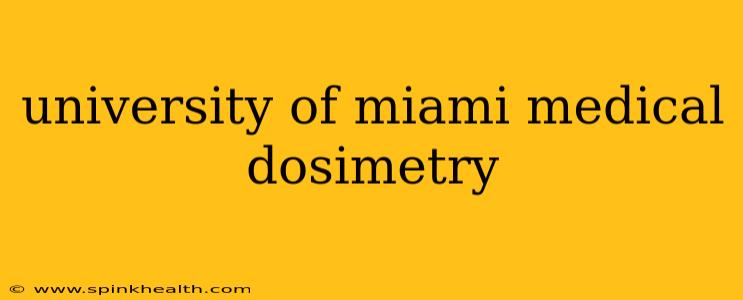The University of Miami (UM) holds a prestigious position in the field of healthcare, and its contributions to medical dosimetry are no exception. This isn't just about numbers and calculations; it's about precision in radiation therapy, a field that demands meticulous planning to effectively target cancerous tumors while minimizing harm to healthy tissues. Let's explore the world of medical dosimetry at UM, examining its programs, research, and the crucial role it plays in cancer treatment.
What is Medical Dosimetry?
Medical dosimetry is the precise science of measuring and calculating radiation doses delivered during cancer treatment. Dosimetrists are the unsung heroes behind the scenes, working closely with radiation oncologists and other healthcare professionals to create treatment plans that maximize the effectiveness of radiation while minimizing side effects. Their work involves sophisticated calculations, advanced technology, and a deep understanding of radiation physics and biology. Think of them as the architects of radiation therapy, ensuring the right amount of radiation reaches the right place at the right time.
Does the University of Miami offer a Medical Dosimetry program?
While the University of Miami doesn't currently offer a dedicated undergraduate or graduate degree program specifically titled "Medical Dosimetry," their strong programs in radiation oncology and related fields provide a robust foundation for students interested in this career path. Students might pursue relevant degrees like medical physics, biomedical engineering, or radiation therapy, then seek specialized training and certification in medical dosimetry after graduation. The university's network and resources can provide excellent opportunities for internships, research, and collaborations in the field.
What kind of research is done in medical dosimetry at the University of Miami?
UM's commitment to cutting-edge research extends to the field of radiation oncology, where advancements in dosimetry are crucial. While specific research projects focused solely on dosimetry aren't always publicly listed under that exact title, the university's faculty and researchers contribute to numerous projects that directly impact dosimetry techniques and precision. This includes research into:
- Advanced imaging techniques: Improving the accuracy of tumor localization and treatment planning.
- New radiation delivery methods: Developing and refining techniques like IMRT (Intensity-Modulated Radiation Therapy) and VMAT (Volumetric Modulated Arc Therapy).
- Treatment planning software: Advancing the algorithms and software used to calculate and deliver radiation doses.
- Biophysics research: Understanding the biological effects of radiation on cancerous and healthy cells to optimize treatment strategies.
What are the career opportunities after completing a relevant program at UM?
Graduates from UM's related programs, who then pursue additional dosimetry certification, are well-prepared for a wide range of rewarding careers. These often include:
- Medical Dosimetrist: Working in hospitals, clinics, or cancer centers, creating and verifying radiation treatment plans.
- Radiation Therapist: Administering radiation therapy under the guidance of a physician.
- Medical Physicist: Conducting research, developing new treatment techniques, and ensuring the quality and safety of radiation therapy equipment.
These positions often require advanced certification through organizations like the American Association of Medical Dosimetrists (AAMD).
How can I learn more about the University of Miami's involvement in radiation oncology?
To gain a deeper understanding of UM's contributions to radiation oncology and the opportunities available to aspiring dosimetrists, it’s best to directly contact the relevant departments. This includes:
- The Department of Radiation Oncology: Reach out to inquire about research opportunities, faculty expertise, and any related programs.
- The Miller School of Medicine: Explore their various departments related to medical physics and biomedical engineering.
By directly contacting these departments, you can gain the most up-to-date and accurate information about UM's involvement in medical dosimetry and related career pathways. The future of cancer treatment hinges on precision, and the University of Miami is playing a vital role in advancing this critical field.

